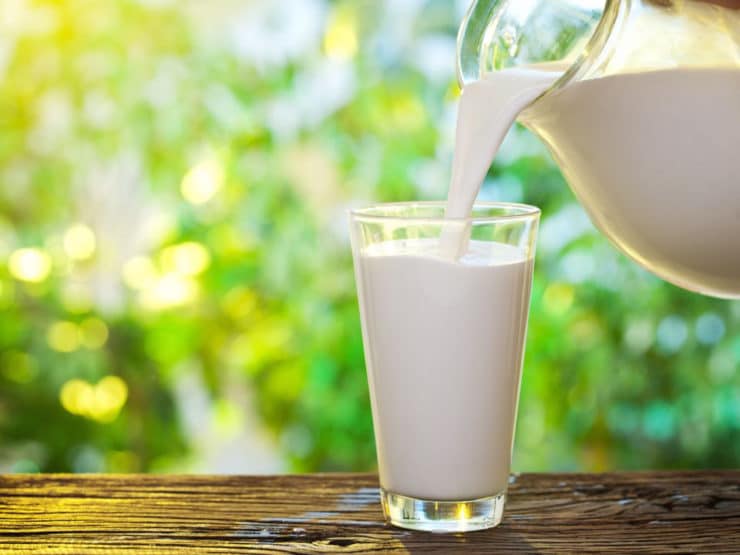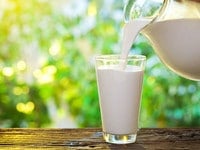
I’ve been buying organic milk and dairy products for the past several years due to concerns about growth hormones and antibiotics found in standard milk and dairy. I grew up drinking 1% and 2% milk, so I continued buying it as an adult assuming it was the best nutritional choice for my family. After reading recent studies, my perspective shifted. New research suggests that consuming whole fat dairy is linked to reduced body fat. While scientists aren’t exactly sure what causes this seemingly counter-intuitive correlation, there are a few theories. Some believe that full fat dairy leads to a greater feeling of satiety, causing people to eat less and feel full. Others point to bioactive substances in the milk that might alter our metabolism. I’ve also learned that organic whole milk contains more helpful fatty acids than conventional whole milk. It has a better balance of fatty acids and is higher in healthy omega-3. This is largely due to the fact that organic farmers must allow their dairy cows to graze in the pasture for a certain amount of hours per week. More and more, the evidence seems to point towards organic whole milk as the best choice for many dairy consumers. People with high cholesterol and other health issues associated with saturated fat intake may want to think twice about making the switch. But for the rest of us, whole milk may be a better choice for maintaining a healthy weight.
I don’t know why I was surprised to learn all of this. After all, whole milk is more natural and closer to what our grandparents and great grandparents were drinking. Of course many argue that raw, unpasteurized milk is the ideal “old fashioned” and nutritionally better way, but I refuse to jump on that bandwagon due to my concerns about food borne illness. That said, overall I’m convinced that we need to take a step back from processed items. The more we gravitate towards simple, natural, organic ingredients, the better off we’ll be. I will continue to enjoy organic whole milk with my family. Not only is it nutritionally superior, it is a heck of a lot tastier than lowfat and nonfat milk.
What do you think? Have you considered switching to whole milk? Are you already drinking it? What do you think about organic dairy vs. non organic? Or have you eliminated milk from your diet completely? I’d love to hear from you.



I consume grass fed Jersey cow milk(whole fat) which is purchased at High Lawn Farm.
The farm is certified Jersey cows only.
The milk is HTST pasteurized to retain all the nutritional benefits and heat stable
immunoglobulins.
They use the LiLi HTST pasteurizer which produces a milk close to raw.A new study which
now shows that the fats in whole milk are actually healthier for you than previously
thought.
Tufts University School of Medicine and Nutritional Sciences conducted this research.I am
a Jersey grass fed advocate the only breed I consume from local farms in our area including Massachusetts (close by)
In fact I will purchase some more on Saturday due to the Thanksgiving holiday.I am a Registered Dietitian (functional medicine) who does research on dairy.
Milk fat does a body good.
Best,
David H.Keyishian,RD. functional medicine
Growing up on only pasteurized skim milk and margarine (yuck!) my transition to full fat dairy was not easy. After taking my time and doing my research, I am now a very, very happy raw, grass-fed, whole milk enthusiast. It has been years and I will never go back. I also love my raw cultured butter. Next goal: make my own cottage cheese with raw, whole milk. I have never felt so satisfied and my rate of dental carries, a problem I experienced for 20 years, is no longer!
Hi there. One thing I am concerned about, is that most organic milks are ULTRA PASTEURIZED. Ultra Pasteurization is a heating process that in my and thousands of others’ opinion, destroy all the vitamins and minerals in milk. If you are going for milk – and not switching to just almond for everything (I think soy is dangerous for many people as it has been linked to some cancers in both sexes,) then you should look for milk that is not ultra pasteurized. There are some. Believe it or not, I sometimes will select a NON ORGANIC milk that is free of hormones than go for organic that is ultra pasteurized. That’s how strongly I believe in this. Please do some research on the subject. I would love for all organic companies to stop this or at least provide some milk without the process. Just plain old pasteurization. I know the ultra makes for a longer shelf life – but so do chemical preservatives, which hopefully many of us have given up. (or pesticides on the fields — terrible.) Regards, Diane L
I buy fat free organic milk for myself – I use it only in cereal and I ed coffee, and the occasional scrambled egg or crustless quiche. I dislike the taste and texture of whole fat milk, & I dislike almond and soy milks, so this is the only thing that works for me. I made the switch to organic a few years ago and I believe it is much healthier than non-organic milk.
This is fascinating! I drank whole milk as a kid (I’m 65), and I have been drinking Lactaid for years, usually 1 or 2%. The idea of not actually being lactose intolerant is hard for me to believe, but I can try organic and still take Lactaid pills, so maybe I will give this a try. (when I was first diagnosed, it was a huge change when I quit doing regular milk. I lost 10 lbs. in a month, so my doctor was convinced I was lactose intolerant.) I don’t know what I will think of whole milk after all these years. One of the problems, at least at my grocery store, is that I have to buy 1/2 gallon, they don’t sell organic milk in smaller amounts. So if I don’t like it, I guess I can cook or bake with it. I too have started to come back to real butter. My husband isn’t sure about all this, he’s been eating margarine or the ‘light’ butter by Land o’Lakes for years. (he’s a doctor, so I’m sure he’ll have comments for me!) Thanks for all the information.
We’ve been using full fat “organic” for several years now. There’s nothing like it! I wish I knew where to find raw mlk in our area of western KY. I know, that should be a breeze, living in a rural area but since the FDA has cracked down on raw dairy sales, there are far less dairies/farmers who sell raw milk now. My grandparents were farmers and had regular customers who purchased fresh milk, butter, eggs, produce and even “sugar-cured” country hams in the fall. There’s nothing like fresh unprocessed foods for nourishing our families.
My SIL gave me an article that milk from Jersey (breed not State) was a different protein and people were tolerant to it. The article was from Mother Jones and stated that when people come to this country they always said that the milk made their stomachs sick. In the US most of the milk does not come from Jersey cows but a European firm was trying a second time to see if it would catch on.
…… I swear by Tori’s recipe for Almond Milk and use only that because it is healthy. I do thin it down, so if you use the organic milk from the farm, why not dilute it like we do with the almond milk to be the 30 calorie drink?
…….For those purchasing the almond milk, never thought of this till now – Why not dilute yourself the full almond milk?
I switched years ago when I read it was much better for you do to the fact that it is the least processed! I belive things are better in their” whole state”. I happen to work for an Organic Grocer & have been fortunate enough to have learned A LOT along he way!
We switched from skim milk to lowfat milk this past year because it keeps longer in the refrigerator. I no longer dispose jugs of milk that have gone bad far before the “use by” date. I wonder if whole milk would keep longer than lowfat milk in the fridge.
Way lower in carbs!
I made the switch from cow’s milk to Unsweetened Original Almond Milk.
I’m a whole milk girl, real butter etc. not one cavity and I’m 53 yrs old! Weight is spot on and look and feel healthy! Wouldn’t have it any other way!
You really thought a lot about this….Thanks for doing the research. And I agree, I am not ready to increase my risk of foodborne illness with raw milk.
One of the things I love about living where I am now – the heart of a truly Amish area in Lancaster County, PA – is being able to find farm fresh everything! Tastier, and I feel so much better. Fresh organic is doable on a limited budget in this area.
Something a lot of folks aren’t familiar with in regard to milk-if you are buying right from a farm or co-op, you will often notice one batch tastes different from another. This is because of the difference in feed through the course of an agricultural year, not because there is anything wrong with the milk. And if you find a dairy that has an all-Jersey herd (a breed of dairy cow), you will notice a difference as well. Jersey milk generally has more of the good fats and protein than a lot of other cow breeds.
So if you’re buying directly from a farm, do your research in advance, and talk to your farmer about their herd! All cows and all herd are not created equal. 🙂
Barbara is so right. Look up the a1 a2 milk debate … Jersey is best for you, tho I was raised on a Holstein dairy and can’t stand the taste of what is sold as milk today in general grocery stores. There is a definite difference nutritionally, digestively, and taste-wise between store- and grass-fed cow’s milk. If you want nutrient-dense, look to raw.
When I cannot get milk from my local farmer, it’s what we have in our house. My daughter has occasionally had not-whole milk and thinks it’s just water. I agree. 😀